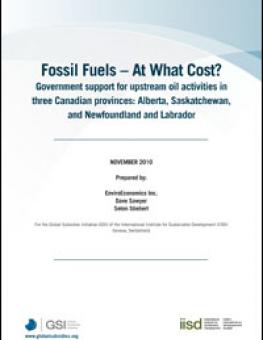
Fossil Fuels – At What Cost? Government support for upstream oil activities in three Canadian provinces: Alberta, Saskatchewan, and Newfoundland and Labrador
Global Subsidy Initiative's second report in the series "Fossil Fuels - At What Cost?" uses an internationally agreed definition of subsidy adopted by the World Trade Organization to determine the value and impact of oil production subsidies in Alberta, Saskatchewan, and Newfoundland and Labrador.
This detailed analysis is the first of its kind in Canada and allows appropriate comparisons of subsidies with other countries.
The study sets out the financial, economic and environmental trade-offs implied by the 63 subsidies identified at the federal and provincial level. It provides a valuable input for Canadian and provincial governments as they develop an energy strategy for Canada and for governments seeking to integrate economic development with options to improve public finances and lower greenhouse gas emissions.
Participating experts
You might also be interested in
How Fossil Fuels Drive Inflation and Make Life Less Affordable for Canadians
New report takes closer look at how Canada’s dependence on fossil fuels impacts energy costs and prices of essentials such as transportation, home heating, and housing.
IISD Applauds Canada’s Reaffirmation to End Domestic Public Finance for Fossil Fuels in Budget 2024
Today's federal budget announcement delivers new measures to support affordability and reaffirms Canada’s commitments on climate action.
The Cost of Fossil Fuel Reliance
Government support for fossil fuels reached at least USD 1.5 trillion in 2023, new data shows.
Increased Support Needed to Achieve India's Clean Energy Goals
India is on track to achieve many of its 2030 clean energy goals but needs to step up government support measures to accelerate the deployment of offshore wind, electric vehicles, and green hydrogen, according to a new report.